In today’s interconnected world, effective communication is a vital skill that supports academic success, personal growth, strong relationships, and future careers. It empowers students to express ideas, collaborate, and engage actively. This article explores the definition, importance, and benefits of communication, with a focus on how it is developed through curricula like the International Baccalaureate (IB), along with practical strategies for improvement.
What are communication skills?
Communication is a two-way process involving the exchange of ideas, emotions, and perspectives. It goes beyond speaking or writing—requiring clear expression, active listening, and appropriate response—making it closely tied to social skills.
Recognised as essential across education and professional domains, communication skills are key to success in school, work, and life. For example, the University of Melbourne, with partners like Cisco and Microsoft, identified core communication competencies vital for 21st-century youth.
These skills encompass a broad range—from verbal and non-verbal communication to digital and cross-cultural literacy. The International Baccalaureate (IB) curriculum places communication at the heart of holistic learning, aligning it with the IB Learner Profile to support students as thoughtful, principled, and reflective global citizens.

All about Communication skills
Key Skill Clusters
Within the comprehensive IB Approaches to Learning (ATL) framework, communication skills are meticulously structured to encompass a wide range of competencies essential for effective interaction. They involve the nuanced exchange of information between people, always involving at least two participants: a sender who encodes a message and a receiver who decodes it. These diverse skills are categorised into the following core clusters:
Exchanging Information
This cluster focuses on the dynamic, interactive components of communication.
- Listening: This goes beyond merely hearing; it’s the ability to listen actively and respectfully to others’ ideas, showing genuine engagement. It involves diligently following information and directions, grasping the nuances of spoken language, and confidently asking for clarification when understanding is incomplete. Active listening is the bedrock of effective dialogue and collaboration.
- Interpreting: This sophisticated skill involves understanding various forms of communication beyond just words. It includes comprehending visual data (like charts or images), audio cues (tone of voice, inflections), and oral communication (speeches, conversations). It also encompasses recognising and creating signs, interpreting abstract symbols and subtle sounds, understanding how images and language convey complex ideas, recognising and deciphering body language, and crucially, being aware of cultural differences that can significantly impact interpretation.
- Speaking refers to the ability to express oneself clearly, concisely, and logically in a variety of settings. It involves actively participating in conversations, articulating thoughts coherently, stating opinions respectfully even when they differ, engaging in productive discussion and negotiation of ideas with peers and teachers, and effectively communicating using various digital environments and multimedia.
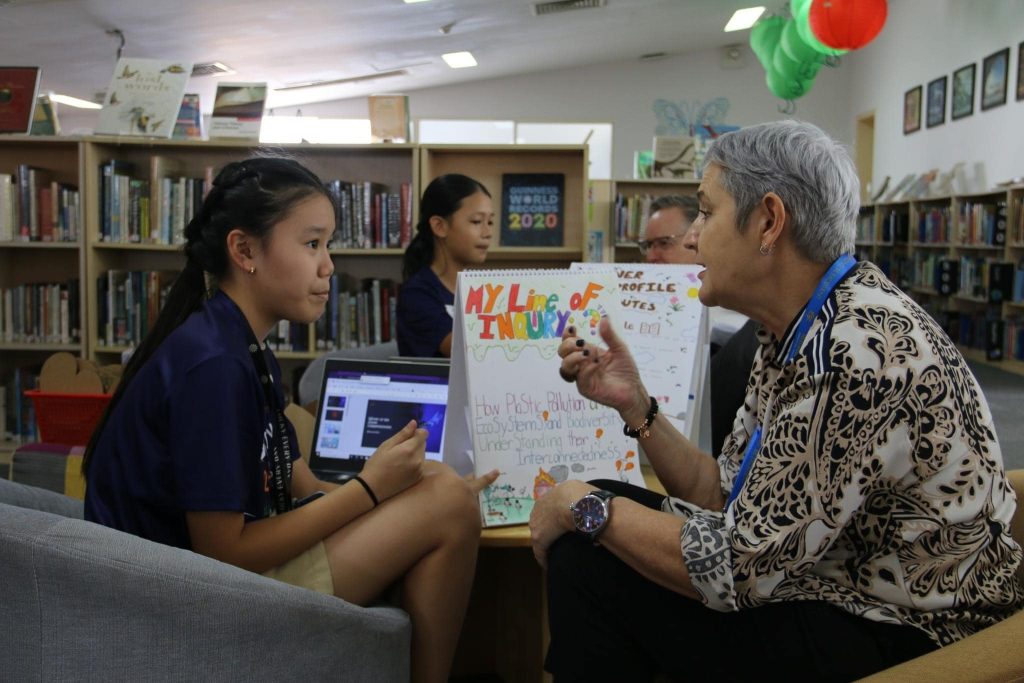
Key skill clusters of communication skills
Literacy
This cluster emphasises foundational skills for understanding and producing written communication.
- Reading: This extends to reading a diverse variety of sources, not just for information but also for pleasure, fostering a lifelong love of learning. It involves reading critically for deep comprehension, making insightful inferences beyond the explicit text, and accurately interpreting complex terms and symbols within different contexts.
- Writing: This skill requires using appropriate forms of writing for different purposes and audiences, adapting style and tone. It includes accurately paraphrasing information to avoid plagiarism, effectively recording and organising logical information from research, and confidently using a range of technologies and digital media to compose and present written work.
ICT (Information and Communication Technology)
This cluster addresses the unique demands of digital communication. Understanding the impact of various media representations and modes of presentation is vital in the digital age. This skill involves critically assessing how information is packaged and delivered. Moreover, it requires making informed and strategic choices about communication modes based on the specific audience and purpose, ensuring messages are received effectively and ethically in a technologically driven world.
The importance of communication skills.
Effective communication skills are not merely an asset; they are a fundamental necessity for students to thrive in academic, professional, and personal spheres. Their importance permeates every aspect of a student’s journey.
Academic Benefits
For students, robust communication skills translate directly into enhanced academic performance. These abilities lead to improved class participation, as students feel confident expressing ideas, asking clarifying questions, and contributing to discussions. They enable stronger presentations, allowing students to articulate their research and understanding clearly and persuasively.
Effective communication also underpins successful collaboration in group work, where shared understanding and mutual respect are essential for achieving common goals. Furthermore, the ability to clearly understand instructions, interpret complex texts, and articulate thoughts in written assignments directly contributes to higher academic achievement across all subjects.
Career Readiness
In today’s competitive global job market, communication skills are consistently ranked among the top attributes employers seek. For students, developing these skills is paramount for career readiness. They are crucial for success in job interviews, enabling candidates to articulate their qualifications, demonstrate problem-solving abilities, and build rapport.
Effective communication plays a crucial role in professional networking, fostering connections that can lead to future opportunities. It’s also indispensable for teamwork, allowing professionals to share ideas, resolve conflicts, and contribute effectively to collective projects. Finally, strong professional writing (emails, reports, proposals) and confident client interactions are cornerstones of success in virtually any modern career.
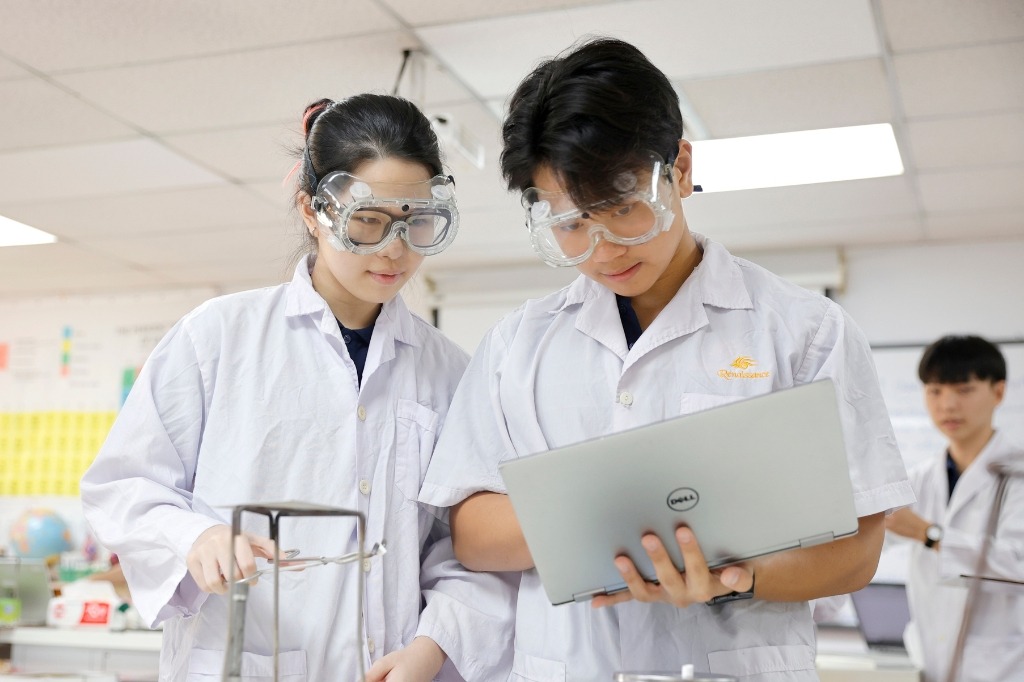
Career Readiness
Personal Development
Beyond academics and career, communication skills are integral to a student’s personal development and well-being. They significantly build self-confidence, empowering individuals to express themselves authentically and engage confidently in social settings. By fostering effective listening and interpretation, communication cultivates empathy, enabling students to understand and relate to others’ emotions and perspectives.
It is a key ingredient in developing leadership qualities, as leaders must inspire, motivate, and guide through clear and persuasive communication. Moreover, engaging in dialogue and debate through effective communication enhances critical thinking, allowing students to refine their arguments and evaluate others’ viewpoints. Ultimately, strong communication skills provide tools for conflict resolution, building healthier relationships, and navigating the complexities of personal life with greater ease and self-assurance.
Developing Communication Skills through the IB Curriculum
The International Baccalaureate (IB) curriculum is designed to develop communication skills, recognising them as one of the five core approaches to learning (ATL), alongside thinking, social, research, and self-management skills.
- Inquiry-based learning in IB encourages students to engage in discussions, ask questions, and collaborate, promoting constant communication as they construct knowledge.
- Student involvement is central, with learners planning their experiences and evaluating outcomes, naturally fosters communication through active participation.
- Projects and exhibitions across IB programs require oral presentations, written work, and teamwork, giving students regular opportunities to practice and refine their communication.
- The emphasis on personal interests aids students in gaining confidence and effectively expressing their insights on topics they hold dear.
- In Theory of Knowledge (TOK), students learn to explain complex ideas, build arguments, and write structured essays. The course also develops critical literacy through media analysis and promotes inclusive class discussions.
- Career-related Programme (CP) includes the Personal and Professional Skills (PPS) course, where students explore communication styles and practice through real-world scenarios and role-play, refining interpersonal effectiveness.
- Learner Portfolio supports reflective communication by allowing students to document their learning, express personal growth, and engage with multiple media formats.
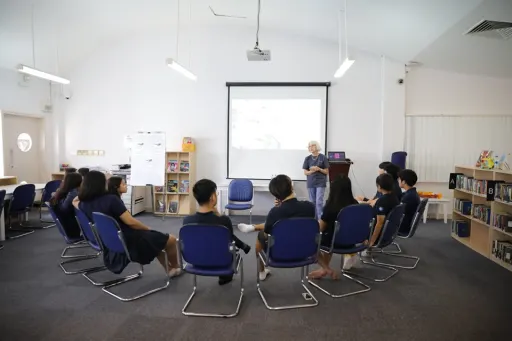
Developing Communication Skills through the IB Curriculum
Practical Activities for Developing Communication Skills
Beyond the formal curriculum, various practical and simple activities can be used to develop communication skills effectively, often with great success, fostering meaningful learning and engagement.
Practice Mindful Listening
This activity helps children listen to genuinely respond to others rather than merely listening to react. It trains them to be fully present in conversations.
A simple exercise involves stopping and listening to surroundings, using guiding questions such as “How far can you hear?”, “What is the quietest sound you heard?”, “Which man-made sounds do you hear?”, “What do you hear coming from nature?”, and “Which parts of your own body can you hear?”. These exercises sharpen auditory perception and teach the value of attentive reception.
Encourage Accountable Talk
Accountable talk is a powerful pedagogical strategy that helps expand children’s repertoire of thoughtful answers, enables in-depth discussions, supports justifying their reasoning, and promotes the acceptance of diverse perspectives. Scaffolds like a “bingo board” chart can be used daily as prompts to develop the art of conversation, encouraging students to expand their range of responses beyond simple “yes” or “no.”
Routines like Think-Pair-Share and using a talking stick or Communicators that promote structured listening and conversation, where the person holding the designated item is the designated speaker, and others listen attentively before responding, foster respectful turn-taking.
Explore Non-verbal Communication
Non-verbal communication is a significant aspect of conveying messages. Activities that explore this include “Human graphs” and “living diagrams,” where students demonstrate their understanding of concepts by physically creating diagrams through drama or arranging themselves without speaking, using only body language to communicate (e.g., forming a line in numerical order to represent data).
This strategy is not only enjoyable but also offers a visual assessment of students’ understanding of concepts, such as math, while simultaneously fostering their communication, self-management, and social skills.
Use Concept Cards to Promote Verbal Reasoning
Concept cards, especially in subjects like mathematics, are an excellent way to bring accountable talk into practice. These cards encourage students to verbally link their mathematical thinking, communicate logical thoughts clearly, justify their reasoning with evidence, analyse and assess various strategies for solutions, reflect upon thinking strategies used by others, and use precise mathematical language correctly. This approach promotes a deeper understanding of concepts beyond calculation.
Communication Beyond the Classroom
The development of communication skills extends significantly beyond the formal classroom environment, with extracurricular activities providing invaluable opportunities for students to practice and refine these abilities in diverse settings.
- Extracurricular Clubs: Clubs such as debate, Model United Nations (MUN), or drama provide informal yet structured platforms for students to practice public speaking, persuasive argumentation, active listening, and collaborative communication in a low-stakes environment.
- Competitions and Public Speaking: Speech contests, debate tournaments, and school-wide presentations push students to refine their presentation skills, articulate complex ideas under pressure, and engage audiences effectively, boosting confidence and clarity.
- Mentorship Opportunities: Both as mentors and mentees, students develop essential communication skills. Mentors learn to provide clear advice, listen empathetically, and adapt their communication style, while mentees practice asking questions, receiving feedback, and articulating their needs.
- Performing Arts and Drama: These activities are powerful tools for developing verbal and non-verbal communication. Students learn voice projection, expressive body language, emotional communication, and collaborative storytelling, all vital for effective interaction.
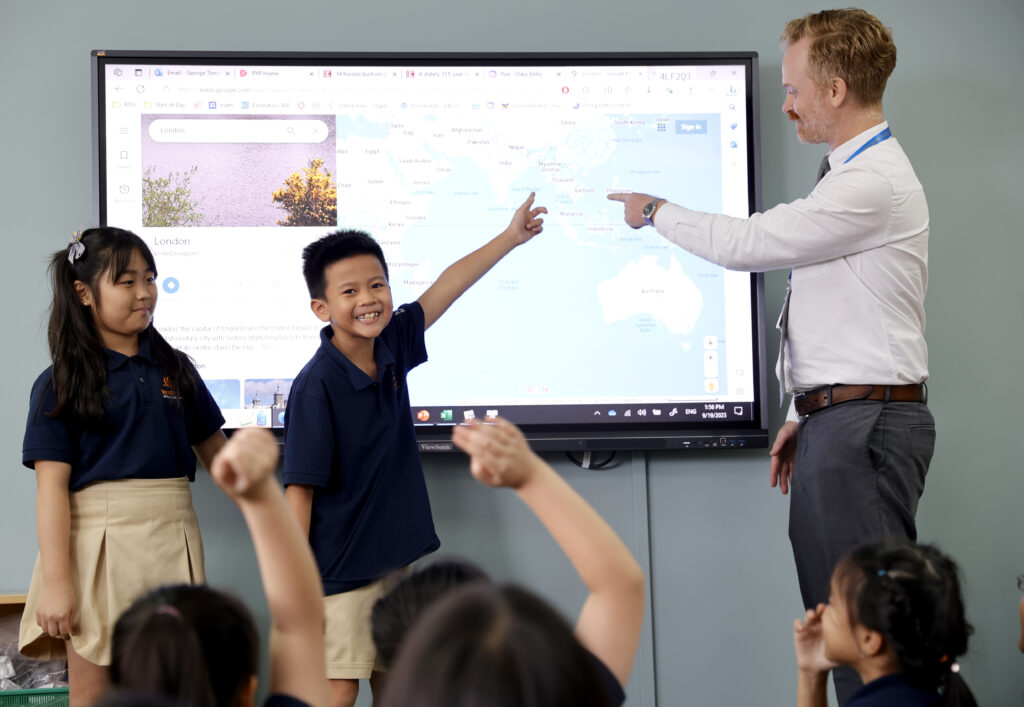
Communication in the classroom
Preparing for University and a career with Communication Skills
The investment in developing strong communication skills during school years pays significant dividends as students transition into higher education and professional life.
- Communication in Admission Interviews: For university admissions, particularly for competitive programs, strong verbal and non-verbal communication can significantly influence an applicant’s success. The ability to clearly articulate experiences, aspirations, and critical thinking can significantly impact the success of an interview.
- Collaborating in Higher Education Settings: University coursework heavily emphasises collaboration, group projects, and seminars. Effective communication skills are essential for successful teamwork, engaging in academic discussions, presenting research findings to peers, and navigating diverse academic viewpoints.
- Public Speaking and Presentations at Work: In virtually every profession, the ability to deliver clear, concise, and persuasive public speeches and presentations is crucial. Strong communication ensures impact and influence when pitching ideas to clients or investors, presenting research findings to colleagues, or leading team meetings.
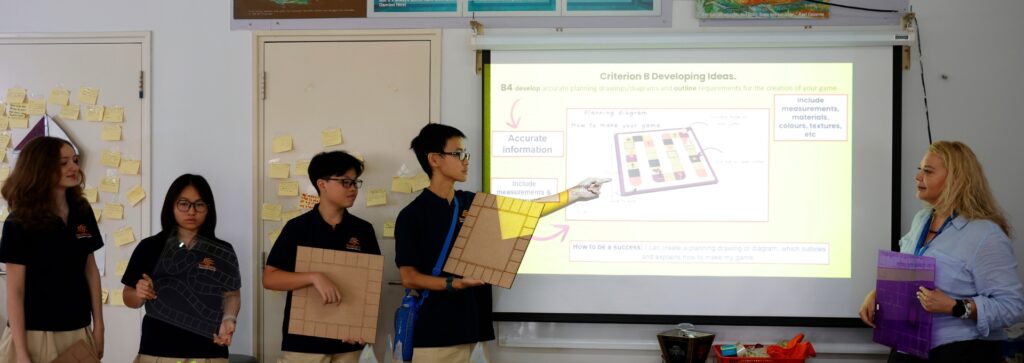
How to prepare communication skills for upper levels
- Building a Global Mindset: In a globalised academic and professional world, effective cross-cultural communication is vital. Students with strong communication skills are better equipped to understand and adapt to different communication styles, build rapport across diverse backgrounds, and collaborate effectively in multicultural teams, fostering a truly global mindset.

